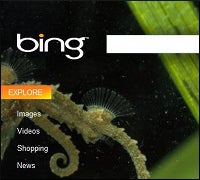 |
When he told business executives Thursday in Chicago that Microsoft will invest in search for the long term, Microsoft CEO Steve Ballmer is putting his company’s money where his mouth is.
Ballmer, speaking at the Executives’ Club of Chicago, told the audience that he is willing to spend between 5 percent and 10 percent of Microsoft’s (NASDAQ: MSFT) operating income for the next five years to make its search business successful, a Microsoft spokesperson confirmed.
Microsoft hasn’t given guidance on its financial numbers for fiscal 2009, which ends two weeks from now on June 30. However, using last year as a measuring stick — the company brought in $22.5 billion in operating income in fiscal 2008 — Ballmer’s promise means Microsoft’s latest play for Google’s market share will be an expensive one.
“That’s between one and two billion dollars a year,” Matt Rosoff, research vice president for consumer products and corporate affairs at Directions on Microsoft, told InternetNews.com.
It’s widely expected that Bing — Microsoft’s relaunched search engine, which debuted at the beginning of the month — will claim a majority of that spending, as the most visible manifestation of Microsoft’s search business.
Despite the hefty price tag, Rosoff said he sees it as a smart and necessary investment for Microsoft.
“It sounds like a big number, but, given the importance to Microsoft’s business, I don’t think that’s too much at all,” he said.
Ballmer has made similar statements before.
“Search is … not content, it’s not community, and it’s not commerce, but search is an important part, it’s sort of a killer app, if you will, for this new world,” he told an audience at last summer’s annual Microsoft financial analyst meeting.
“Google spends about $2.5 billion and growing on R&D … We’re going to certainly have to think about the bogey as at least $1.2 billion or $1.5 billion a year to stay competitive,” Ballmer said at the time.
Ballmer may reveal further details of Microsoft’s planned investments in Bing during the company’s 2009 financial analysts meeting, scheduled for July 30, a week after it reports its fiscal 2009 earnings a week.
Early payoff for Bing?
For the time being, Microsoft’s bet on Bing may be paying off ahead of schedule. Early statistics show a slight rise in Microsoft’s overall share of searches in the U.S. in Bing’s first two weeks of public use, even surging past Yahoo (NASDAQ: YHOO) briefly on its first day.
Still, Ballmer and company have a long way to go to catch up to market leader Google (NASDAQ: GOOG).
While there are no official statistics for June yet, tracking firm comScore’s figures for May showed Google with 65 percent of U.S. searches, followed by Yahoo with 20.1 percent, and Microsoft with only 8 percent.
[cob:Special_Report]However, since Bing has been in the market for less than a month, and changes in Microsoft’s market share could be driven by user curiosity, it is impossible to tell whether Bing will do what previous Microsoft search engines have been unable to do: break into second place in a three-horse race with Google in the distant lead.
“We won’t see the June figures until mid-July, and at that time, we’ll be able to see what effect Bing is having on the search market,” a comScore spokesperson told InternetNews.com.
Still, even if Microsoft doesn’t pose a serious threat to Google in search, a heavy investment in Bing may work simply as a strategic move to hold Google at bay in other areas, according to Rosoff.
“They [Microsoft] view Google as a critical threat, so they’ve got to try and put a cap on Google’s business,” Rosoff said. Part of that has to do with keeping Google from threatening Microsoft’s core businesses, like Microsoft Office and even the desktop operating systems markets.
“Besides, nobody’s going to talk Ballmer out of it,” Rosoff added.


